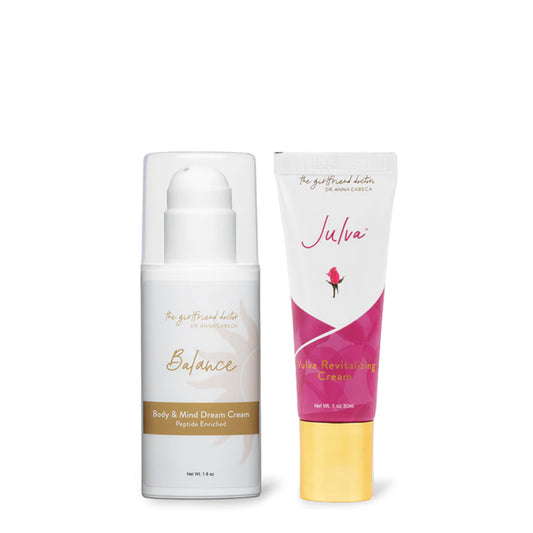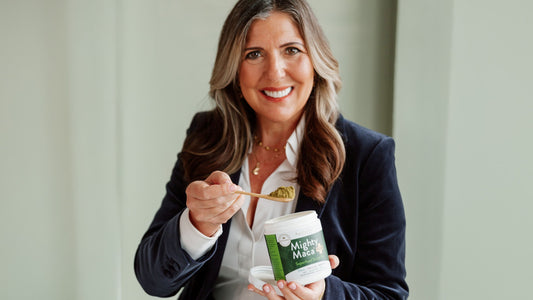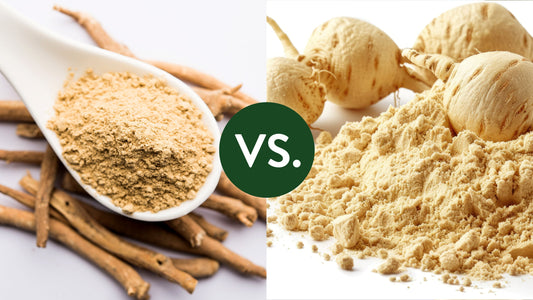Let me tell you something that might surprise you: some of the most sexually satisfied women I know are over 50. Not despite their age, but because of the wisdom, confidence, and freedom that come with this stage of life. Yes, sex over 50 can be wildly fulfilling and incredibly fun.
I know that's not necessarily how you're feeling right now if you're reading this article. You might be dealing with vaginal dryness that makes intimacy uncomfortable or even painful.
And maybe you're wondering if the passionate woman you once were has disappeared forever.
Perhaps you're lying awake at night worrying that your best sexual years are behind you.
I'm here to tell you something important: they're not.

Somewhere along the way, our culture decided that women's sexuality has an expiration date. That after menopause, we're supposed to gracefully accept that our intimate lives are over, or at least significantly diminished. We're told that vaginal dryness, painful sex, and decreased desire are just "part of getting older" — end of story.
This narrative is not only false, it's harmful. It robs you of pleasure, intimacy, and a fundamental part of your well-being during what could be some of the most sexually fulfilling years of your life.
While many women's sex drive after 50 changes, it doesn’t have to disappear permanently.
And while the physical changes that come with perimenopause and menopause are real, they are not permanent sentences, either. More importantly, they don't define your capacity for pleasure, connection, or sexual satisfaction.
The Real Talk About What's Happening in Your Body
Let's start with the truth about what's actually going on. During perimenopause and menopause, your estrogen levels decline significantly. Estrogen is like the conductor of your intimate wellness orchestra — it helps maintain the thickness, elasticity, and lubrication of vaginal tissues.
When estrogen decreases:
Vaginal walls become thinner and less elastic
Natural lubrication decreases dramatically
The vaginal pH changes, making you more susceptible to irritation and infection
Blood flow to the genital area can decrease
The vaginal opening may become smaller
This isn't your imagination, and it's not your fault. These are real, physiological changes that affect the majority of women after menopause.
That’s right, studies suggest (1,2):

50-60% of postmenopausal women experience vulvovaginal atrophy (VVA) symptoms.

50-60% of postmenopausal women experience vulvovaginal atrophy (VVA) symptoms.

Only 25% of women with VVA symptoms receive proper treatment.

75% of VVA cases go undiagnosed, often because:
Women are embarrassed to talk about it.
They think it's just a normal part of aging.
Healthcare providers aren’t proactive about asking.
Why the gap? Because we've been taught to suffer in silence, to accept these changes as inevitable, or to feel ashamed about discussing our intimate health.
The Emotional Impact Is Real
Before we dive into solutions, let's acknowledge something crucial: the emotional toll of these changes is just as significant as the physical symptoms.
Many women tell me they feel:
Disconnected from their bodies - like they no longer recognize themselves sexually
Anxious about intimacy - worried about pain or disappointing their partner
Grieving their former sexual selves - mourning the spontaneous desire and easy arousal they once experienced
Invisible or undesirable - believing they're no longer sexually relevant
Frustrated with their healthcare - feeling dismissed when they bring up these concerns
If any of this resonates with you, please know that these feelings are completely valid. Sexual wellness isn't just about physical function. It's deeply connected to our sense of identity, confidence, and overall well-being.
The Plot Twist: Why Sex Over 50 Can Actually Be Amazing
Many women report that their sex lives actually improve after menopause, once they address the physical challenges.
Why? Several reasons:
Freedom from Pregnancy Concerns: No more worrying about birth control or unplanned pregnancy can lead to more spontaneous, relaxed intimacy. Note: this isn’t a permission slip to engage in unprotected sex at 50…you can still contract sexually transmitted diseases, so be careful out there.
- Deeper Self-Knowledge: By 50, most women know their bodies, preferences, and boundaries better than they ever have. This self-awareness translates to better communication and more satisfying experiences.
Less Pressure, More Pleasure: Without the hormonal fluctuations of monthly cycles, many women find their desire becomes more consistent and less complicated.
Relationship Maturity: Long-term partners often have better communication and more emotional intimacy, which can enhance physical connection.
Permission to Prioritize Pleasure: Many women finally give themselves permission to prioritize their own pleasure without guilt or shame.
Practical Solutions That Actually Work
Now let's talk about what you can do to reclaim your intimate wellness. The good news is that there are more effective options available today than ever before.
Immediate Relief Strategies
High-Quality Lubricants: Not all lubricants are created equal. Look for:
Long-lasting, silicone-based formulas for intercourse
Water-based options for daily comfort
Organic, chemical-free versions if you have sensitive skin
Avoid anything with glycerin, parabens, or numbing agents
Vaginal Moisturizers: Unlike lubricants used during intimacy, vaginal moisturizers are designed for regular use to maintain tissue health. Apply 2-3 times per week or daily for ongoing comfort.
Take Your Time: Arousal takes longer as we age, and that's perfectly normal. Extended foreplay isn't just helpful — it's essential for comfort and pleasure.
Pelvic Floor Health: A strong, flexible pelvic floor supports blood flow and sensation. Consider:
Regular pelvic floor exercises (Kegels)
Pelvic floor physical therapy
Dilators if narrowing has occurred
Lifestyle Factors That Make a Difference
Stay Sexually Active: Regular sexual activity (with a partner or solo) helps maintain blood flow and tissue elasticity down there.
Manage Overall Health :
Stay hydrated. Dehydration affects all mucous membranes
Exercise regularly to improve circulation
Manage stress, which can impact libido and arousal
Consider whether medications might be affecting your sexual function
Communication is Key: Whether you're in a long-term relationship or exploring new connections, honest communication about your needs, concerns, and boundaries is essential.
Redefining Intimacy and Pleasure
Here's something liberating: this is an opportunity to expand your definition of intimacy and pleasure. Great sex isn't just about penetration — it's about connection, sensation, and satisfaction.
Now is the perfect time to consider exploring:
Extended sensual massage
Different types of touch and stimulation
Toys designed for mature women's bodies
Mindful intimacy practices that focus on presence and connection
Solo exploration to reconnect with your own pleasure
When to Seek Professional Help
You should talk to a healthcare provider if:
Over-the-counter options aren't providing relief
You're experiencing pain during or after intimacy
You have recurring infections or irritation
Your symptoms are affecting your quality of life or relationships
You're interested in exploring hormone therapy options
Don't accept dismissive responses like "it's normal for your age." You deserve a provider who takes your concerns seriously and offers real solutions.
The Mindset Shift That Changes Everything
Perhaps the most important thing I can tell you is this: your sexuality doesn't decline with age — it evolves. The urgent, hormone-driven desire of your younger years might be different now, but it can be replaced with something deeper, more intentional, and potentially more satisfying.
This transition asks you to:
Release old scripts about how sex "should" be
Embrace your body as it is now while working to optimize its function
Communicate more openly about your needs and desires
Prioritize your pleasure without guilt or apology
See this as an opportunity for discovery rather than loss
Your Sexual Renaissance Awaits
I've seen countless women transform their sex lives after 50, not by trying to turn back the clock, but by embracing this new chapter with knowledge, tools, and a commitment to their own pleasure and well-being.
Your body might be different now, but it's still capable of incredible pleasure, deep connection, and profound satisfaction. The women who thrive sexually after menopause aren't the lucky ones — they're the ones who refuse to accept that their intimate lives are over and take action to address the challenges they're facing.
You have permission to want a fulfilling sex life at any age. You have the right to seek solutions for physical challenges. And you absolutely deserve to experience pleasure, intimacy, and sexual satisfaction for as long as you desire it.
Making The Most Of Sex Over 50
If you're ready to reclaim your intimate wellness:
Start with one small change - whether that's trying a high-quality lubricant, scheduling a conversation with your healthcare provider, or simply giving yourself permission to prioritize your sexual well-being.
Educate yourself about the options available. Knowledge is power, and understanding your choices helps you advocate for yourself.
Find your support system - whether that's an understanding practitioner, a trusted friend, or online communities of women navigating similar challenges.
Be patient with the process - healing and improvement take time, but every step you take is an investment in your overall well-being and quality of life.
Remember: your best sexual years don't have to be behind you. In fact, they might just be beginning.











